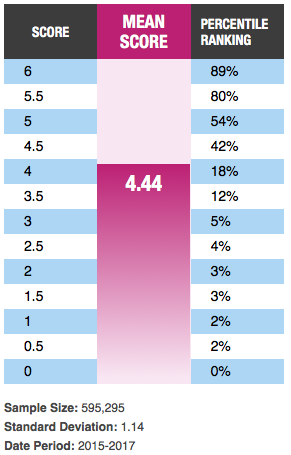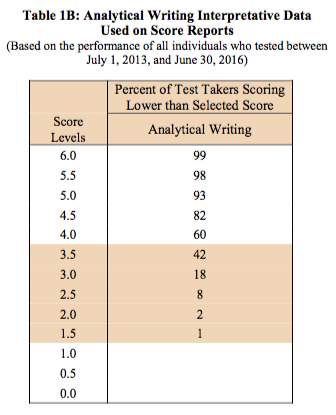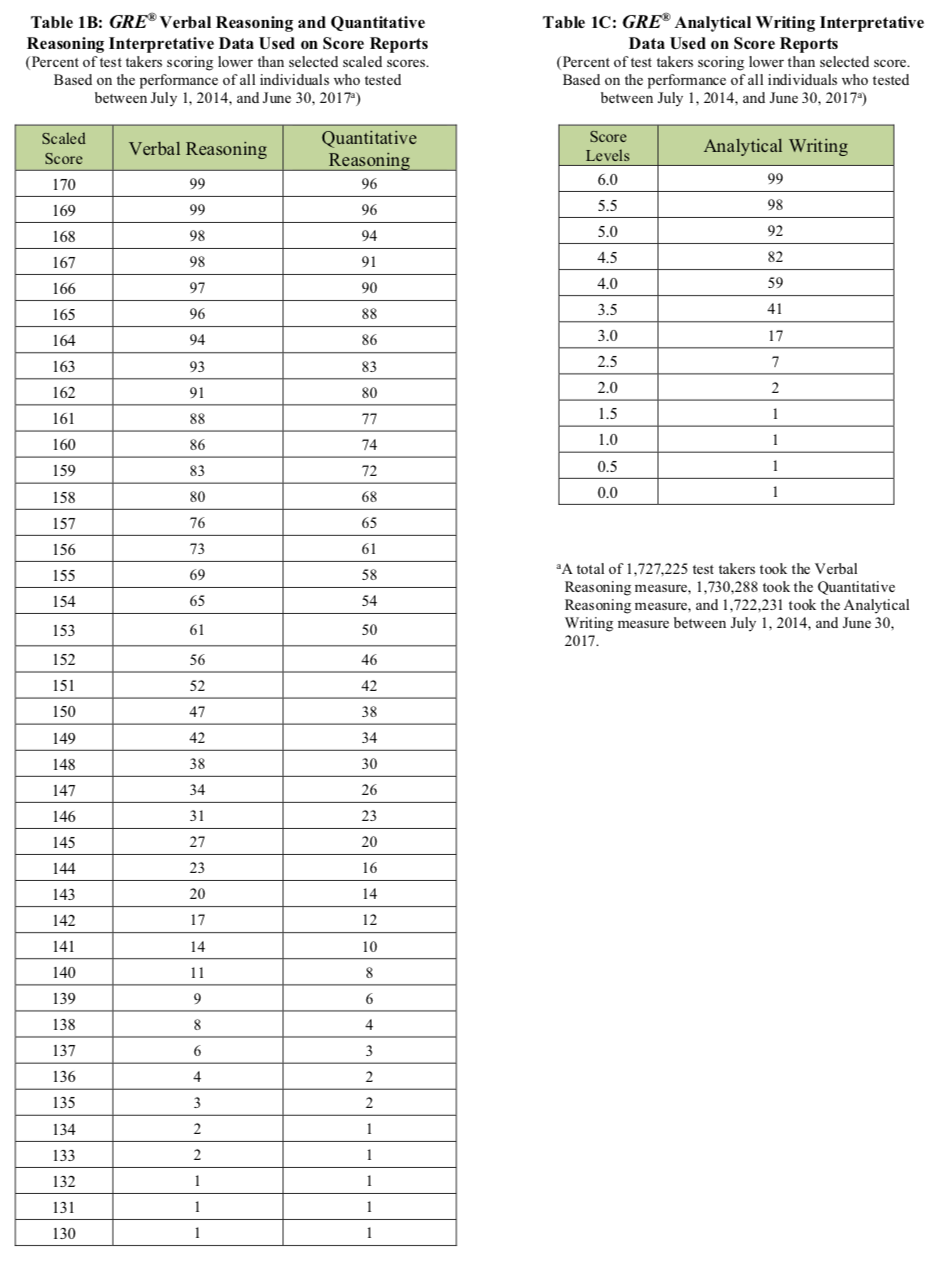
GRE Prep Club Daily Prep
Thank you for using the timer - this advanced tool can estimate your performance and suggest more practice questions. We have subscribed you to Daily Prep Questions via email.
Customized
for You
Track
Your Progress
Practice
Pays
Not interested in getting valuable practice questions and articles delivered to your email? No problem, unsubscribe here.
GRE score (percentile) and the career outcomes
[#permalink]
 Updated on: 14 Mar 2025, 00:57
Updated on: 14 Mar 2025, 00:57
15
Expert Reply
4
Bookmarks
GRE Score Percentiles & Correlation between the GRE score (percentile) and the career outcomes
The GRE test comprises of 3 sections
- Verbal Reasoning: 27 Questions divided into 2 Sections, 41 minutes as total. The verbal reasoning score can range from 130-170 in one-point increments. (One point for each correct answer)
- Quantitative Reasoning: 27 Questions divided into 2 Sections, 47 minutes as total. The quantitative reasoning score can range from 130-170 in one-point increments. (One point for each correct answer)
- Analytical Writing Assessment: 1 Essay Questions: the Issue Essay. This can range from 0-6 in half-point increment.
What is a "percentile" ?
Quote:
A percentile (or a centile) is a measure used in statistics indicating the value below which a given percentage of observations in a group of observations fall. For example, the 20th percentile is the value (or score) below which 20% of the observations may be found.
The term percentile and the related term percentile rank are often used in the reporting of scores from norm-referenced tests. For example, if a score is at the 86th percentile, where 86 is the percentile rank, it is equal to the value below which 86% of the observations may be found. In contrast, if it is in the 86th percentile, the score is at or below the value of which 86% of the observations may be found
The term percentile and the related term percentile rank are often used in the reporting of scores from norm-referenced tests. For example, if a score is at the 86th percentile, where 86 is the percentile rank, it is equal to the value below which 86% of the observations may be found. In contrast, if it is in the 86th percentile, the score is at or below the value of which 86% of the observations may be found
How GRE Section level adaption works to obtain your percentile
What percentile ranks?
The GRE score report also gives you the percentile rank for each test score. The scaled score raises the question if the scores you’ve got would be considered a good score or not. How do you compare your test performance with others who have taken the test?The percentile ranks are a good way to know where you stand.
(Percent of test-takers scoring lower than selected scaled scores. Based on the performance of all individuals who tested Between July 1, 2017, and June 30, 2020)
These ranks are based on the GRE scores of those who tested earlier within a three-year period. For those testing in 2016-17, the percentile ranks are calculated on the performance of those who were tested between July 1, 2012 and July 30, 2015.
Source: ETS
Standardized Tests Predict Graduate Students’ Success - Correlation between the GRE score (percentile) and the career outcomes
Standardized tests are used to forecast which students will be the most successful and obtain the greatest benefit from graduate education in disciplines ranging from medicine to the humanities and from physics to law. However, controversy remains about whether such tests effectively predict performance in graduate school. Studies of standardized test scores and subsequent success in graduate school have often suffered from limited sample size and present mixed conclusions of variable reliability.
Several meta-analyses have been conducted to extract more reliable conclusions about standardized tests from a variety of disciplines.
Four consistent findings emerged:
(i) Standardized tests are effective predictors of performance in graduate school.
(ii) Both tests and undergraduate grades predict important academic outcomes beyond grades earned in graduate school.
(iii) Standardized admissions tests predict most measures of student success better than prior college academic records do.
(iv) The combination of tests and grades yields the most accurate predictions of success.
Tests as predictors. Standardized test scores correlate with student success in graduate school.
This is also confirmed largely by the existing literature
On the other hand, several meta-analyses have been conducted to extract more reliable conclusions about standardized tests from a variety of disciplines. One of the most important was released in 2021 after peer-reviewed and the author did not find a strong correlation between standardized tests - particularly the GRE General Exam - and Graduate Students’ Success.
Quote:
The authors of the present investigation share the common ground with Goldberg and Alliger who maintain that investigators exploring the validity of GRE had better start off from the very beginning at ground zero and define the criteria which adequately demonstrate what exactly the GRE is to predict.
The answer probably is in the middle
Standardized admission tests provide useful information for predicting subsequent student performance across many disciplines. However, student motivation and interest, which are critical for sustained effort though graduate education, must be inferred from various unstandardized measures including letters of recommendation, personal statements, and interviews.
Source: Effectively using predictors of success for student funding - Texas A&M University
Standardized Tests Predict Graduate Students’ Success - Nathan R. Kuncel* and Sarah A. Hezlett (2007)
A Meta-Analysis on the Predictive Validity of Graduate Record Examination (GRE) General Test - Mohammad Hasan Razmi, Masoud Khabir, Shouket Ahmad Tilwani (2021)
The Validity of Scores from the GRE® revised General Test for Forecasting Performance in Business Schools: Phase One - John W. Young, David Klieger, Jennifer Bochenek, Chen Li, Fred Cline (2014)
Show: :: Img
Attachment:
di new.jpg [ 189.35 KiB | Viewed 634586 times ]
Attachment:
percentile-80.gif [ 6.81 KiB | Viewed 47785 times ]
Attachment:
GRE overview sections GRE Prep Club.jpg [ 116.3 KiB | Viewed 43012 times ]
Attachment:
GRE exam adaption sections.jpg [ 79.7 KiB | Viewed 47767 times ]
Attachment:
GRE AWA percentile 2017-2020.jpg [ 42.73 KiB | Viewed 48992 times ]
Attachment:
GRE Percetile score 2017-2020.jpg [ 165.49 KiB | Viewed 64302 times ]
Attachment:
GRe score distribution.jpg [ 40.96 KiB | Viewed 58585 times ]
Attachment:
GRE Standardized test scores correlate with student success in graduate school.jpg [ 87.63 KiB | Viewed 48035 times ]
Attachment:
GRE Standardized admission tests provide useful information.jpg [ 89.78 KiB | Viewed 48437 times ]
Attachment:
QuWmF.jpg [ 21.08 KiB | Viewed 81388 times ]
Re: GRE score (percentile) and the career outcomes
[#permalink]
 22 Mar 2018, 08:18
22 Mar 2018, 08:18
AWA section of GRE and GMAT. I have not found any chart which compares GRE's and GMAT's AWA section. Are these sections comparable? By looking at the percentile distribution GRE's essays are graded much tougher than GMAT's essay. Can somebody give me more information about the differences and similarities between these two AWAs.
I appreciate it!
I appreciate it!
Manager

Joined: 10 Apr 2016
Status:Professional GRE Tutor since 2002
Affiliations: AB, cum laude, Harvard University
Posts: 70
Given Kudos: 0
Location: United States (CA)
Age: 40
GRE 1: Q168 V169

Re: GRE score (percentile) and the career outcomes
[#permalink]
 23 Mar 2018, 14:53
23 Mar 2018, 14:53
2
Expert Reply
Ivica wrote:
AWA section of GRE and GMAT. I have not found any chart which compares GRE's and GMAT's AWA section. Are these sections comparable? By looking at the percentile distribution GRE's essays are graded much tougher than GMAT's essay. Can somebody give me more information about the differences and similarities between these two AWAs.
I appreciate it!
I appreciate it!

https://www.mba.com/us/the-gmat-exam/gmat-exam-scores/your-score-report/what-percentile-rankings-mean.aspx#tab5

For reference...top is GMAT; bottom is GRE.
-Brian




